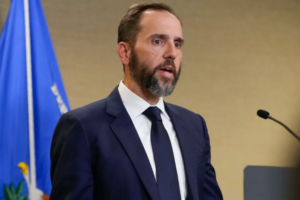Michael Duffey, President Donald Trump’s nominee for undersecretary of defense for acquisition and sustainment, previously directed the Pentagon to withhold military aid from Ukraine in 2019, a decision linked to Trump’s efforts to pressure Ukrainian President Volodymyr Zelenskyy to investigate the Biden family. This action was a significant part of the impeachment proceedings against Trump during his first term.
Duffey, who served as the associate director at the Office of Management and Budget (OMB) during Trump’s first term, instructed the Pentagon to withhold $391 million in security assistance to Ukraine starting in July 2019. The hold remained in place until mid-September as Trump sought a public commitment from Zelenskyy to launch an investigation into Joe Biden and his son Hunter Biden’s involvement with the Ukrainian energy company Burisma.
This past connection has raised concerns among some senators about whether Duffey, if confirmed for the new role, would adhere to the law given his prior actions involving the withholding of foreign aid. The position he is nominated for oversees a substantial budget of $311 billion.
Withholding funds for a policy reason violates the 1974 Impoundment Control Act, which restricts the executive branch from freezing funds that Congress has allocated. The hold on military aid to Ukraine became a central issue in the impeachment of President Trump in December 2019, where he was charged with abuse of power and obstruction of Congress. However, Trump was later acquitted by the Senate.
In a letter obtained by The Associated Press, Massachusetts Senator Elizabeth Warren expressed concerns to Michael Duffey about his past involvement in withholding aid to Ukraine, questioning whether he would follow the law if confirmed for the influential Pentagon position that oversees a substantial weapons procurement budget. This role has been critical in managing over $66 billion in military assistance to Ukraine since Russia’s invasion in February 2022.
Kori Schake, a senior fellow and director of foreign and defense policy studies at the American Enterprise Institute, defended Duffey’s experience, stating that his background in the budget office would make him an effective weapons purchaser for the Pentagon.
Kori Schake emphasized that Duffey and others who support the presidential power to withhold congressionally appropriated funds should be required to commit, during confirmation hearings, to fully spending the funds Congress has allocated.
In response, Senator Elizabeth Warren sent Duffey over 40 questions ahead of his Senate confirmation hearing, seeking more details about his role in the 2019 aid freeze and whether he would be cooperative with congressional oversight. Warren also pointed out that Duffey had previously refused to comply with a subpoena to testify during the impeachment investigation, suggesting that his lack of transparency could undermine his ability to be open and honest while overseeing critical national security programs.
The White House has not commented on Duffey’s nomination or whether it signals a shift in the U.S. approach to providing weapons support to Ukraine. Trump was impeached a second time in 2021 following the January 6 attack on the U.S. Capitol.













